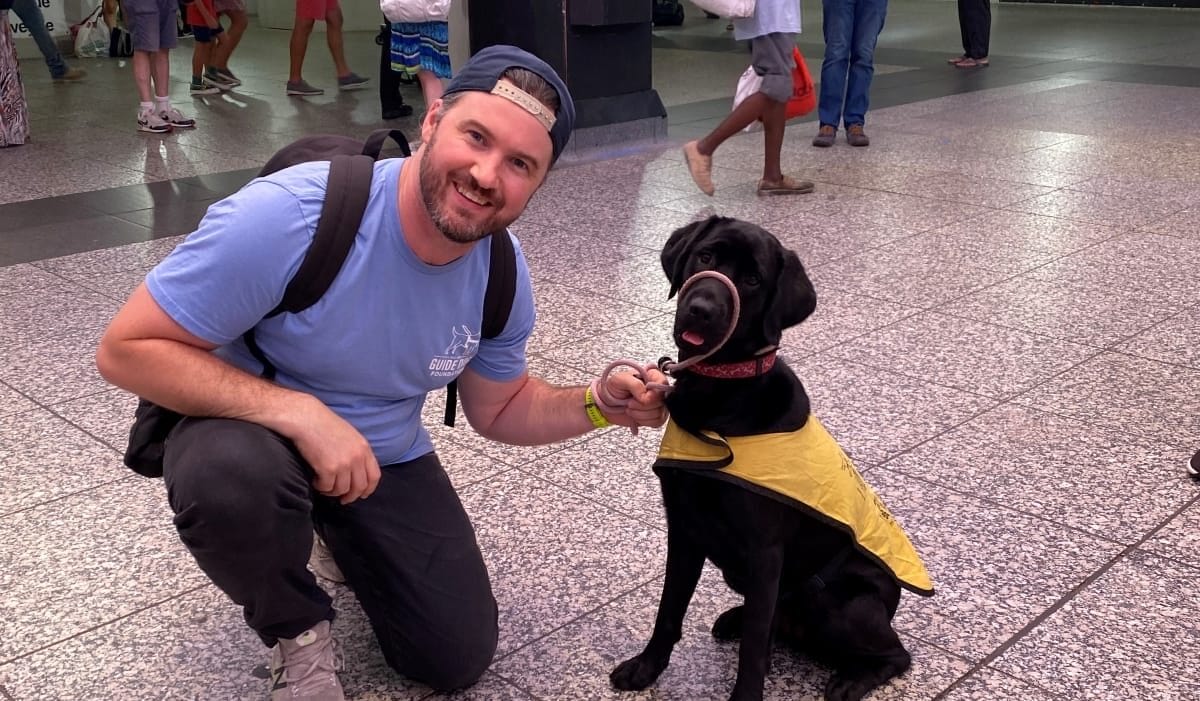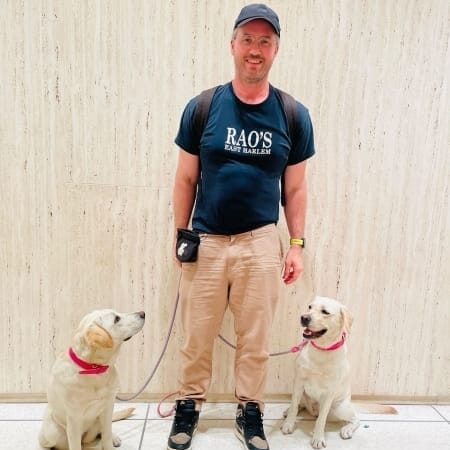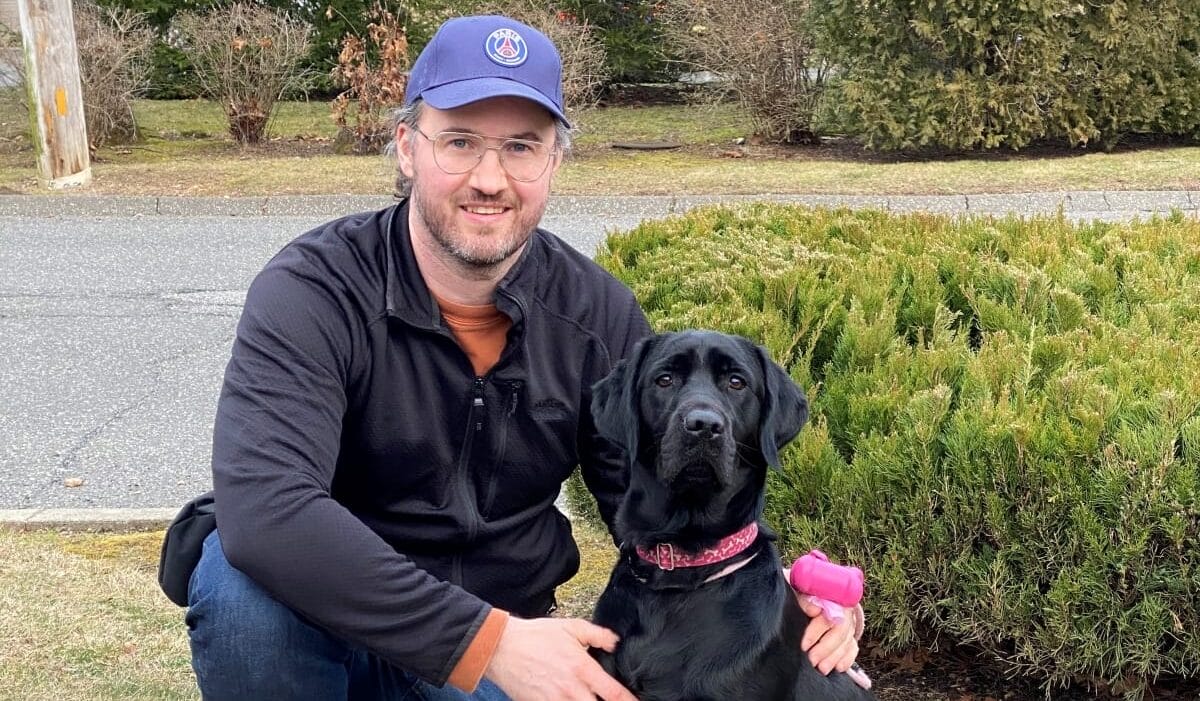Guiding Lives Through a 24/7 Commitment to Raising Service Dogs

Meet Daily Point of Light Award honoree Michael Lawrence. Read his story, and nominate an outstanding volunteer or family as a Daily Point of Light.
Michael Lawrence, originally from Toronto, Canada, now calls Brooklyn, New York, home. His journey into volunteerism with the Guide Dog Foundation began in 2018, but his connection to the visually impaired community stretches back much further. Growing up in Canada, Michael was familiar with the Canadian National Institute for the Blind (CNIB), an organization that provides a range of services to the visually impaired, including guide dogs. However, it was his grandmother, who was legally blind, who deepened his awareness and connection to the community.
In 2020, Michael’s desire to support the visually impaired took a new direction. He was training to be a marathon guide for a visually impaired runner in the New York Marathon, but the race was canceled due to the COVID-19 pandemic. Searching for a way to continue making a difference during such a challenging time, Michael turned to raising guide dogs.
Michael is currently raising his third puppy for the Guide Dog Foundation. His first puppy went on to become an explosives detection dog for a private security firm, while his second puppy transitioned to BluePath Service Dogs, where she now serves as a service dog for a young individual with autism. The Guide Dog Foundation collaborates with other organizations to find alternative careers for dogs that are not suited to be guide dogs, ensuring each dog can still make a meaningful impact.
What makes Michael’s volunteer work even more remarkable is how he integrates it into his daily life. Michael works at Amazon, a dog-friendly employer, which allows him to bring the puppies he is raising to work with him. This not only aids in the socialization of the dogs but also gives his colleagues a chance to interact with and support his mission.
Read on to hear more about Michael’s story and his ongoing dedication to training and socializing future guide dogs.

Tell us about your volunteer role.
I volunteer with the Guide Dog Foundation, which is also responsible for America’s VetDogs. My role is a puppy raiser. Generally speaking, the dogs need to be of a certain age before they’re ready for their final training with professional trainers. Until then, there’s a team of puppy raisers who take care of the dogs from around 2 months until they’re ready to go into that training at about 16 to 20 months, depending on the dog. Our job as volunteers is to make sure the dogs are well-socialized, have good house manners, have decent obedience skills and are ready for the next step. Then there are professional trainers who teach them all the stoplights and more challenging elements.
What inspired you to get started with this initiative?
I grew up with a yellow lab, which looks like the missing third sister of the two dogs I’m currently raising. I had a blind grandmother but she never had a guide dog, so I didn’t grow up with guide dogs. I was volunteering as a guide for a blind runner who was training for the 2020 New York City Marathon. However that was cancelled because of COVID. But during that training, I’d met some of the blind athletes and their dogs, so I had spent a decent amount of time around guide dogs.
When COVID hit and the race got cancelled, like a lot of people, I wanted a dog. And it seemed like a very natural connection that would allow me to help the same community of people. I reached out to Guide Dog Foundation and was fortunate enough to get my first dog Guinness.
What’s your personal favorite dog breed?
It’s got to be a Labrador Retriever, right?! My first two guide dogs were half Lab-half Golden mixes and they were absolutely lovely. My current dogs are pure labs, which is what I had growing up. I highly recommend Labs or Lab mixes.
Why are guide dogs so important for blind or visually impaired people?
I think visual impairment can be extremely limiting for a lot of people and can create a sense of isolation. And walking with a cane can be pretty unsettling. The fact is that most people who are blind aren’t born blind but become blind, which means there’s often a huge transition and it’s an extremely difficult position to be in. A guide dog is such a magical addition to their life because it gives them a sense of mobility again. It allows them to get out of their house and do more than they normally do.
Guide dogs also provide a tremendous sense of companionship. Not only are they super smart and capable navigators, but they’re also amazingly loving dogs. So it’s twofold for people who receive these dogs: it allows them to expand the world they live in and regain their sense of independence and freedom, and it also allows them to have an incredible companion along the way.
What is the puppy raising process like and how long does it typically take?
It varies by dog. The dogs are in the puppy raiser program from 2 months until they’re ready for training, but they sometimes get transferred around a little. My most recent dog was raised from 2 months to 9 months in a small town at the University of Maryland. Guide Dogs wanted to give her an opportunity to be in a more urban environment since many blind and visually impaired people live in cities. So they transferred her to me in Brooklyn and I’ve been able to take her on the subway and on more elevators, and expose her to more traffic, more crowds, more dogs, more people.
Living in the city and volunteering with Guide Dogs means I’ve gotten several transfers because I have the opportunity to expose them to different things, especially when they’re raised in smaller, more suburban or rural areas.
I work for Amazon and they’re a dog-friendly employer, so I can bring both of the dogs to the office. Of course, everyone loves them. If I come into work and they’re not with me, people come up and ask me where they are. They’re two beautiful matching yellow Labs. I bring them on the subway to work. I’ve taken Ellie and Chloe to Nets basketball games. It’s really fun.

What’s been the most rewarding part of your work?
Volunteering with Guide Dogs is very cool because it’s a long-term project. It’s not two hours here or there; it’s all day, every day. You have the chance to watch these dogs grow up from extremely little puppies to life-changing pets for a person. Seeing them achieve their potential and then seeing how transformational it can be for the person, is incredibly rewarding. Also, it’s a puppy! You just got to spend an important, lovely time in that dog’s life.
Why is it important for others to get involved with causes they care about?
It encourages a deeper level of participation. If it’s something that’s near and dear to your heart, you’re going to be more passionate about it than something that isn’t. It provides a different level of connection to an issue, as well a sense of personal reward you get from the work you’re doing.
Anything else you’d like people to learn from your story?
For anyone who’s interested, there’s a documentary called Pick of the Litter that goes through the whole volunteer process, from puppy to the final pairing with the blind person. It does such a good job showing how this process works, how emotional it can be to give up the dogs and how emotional and life-changing it is for the person receiving the dog.
Even now, on Instagram I follow the mom of the young person my second puppy got paired up with. Seeing the ways she’s transformed their life is just unbelievable.
Do you want to make a difference in your community like Michael? Find local volunteer opportunities.
